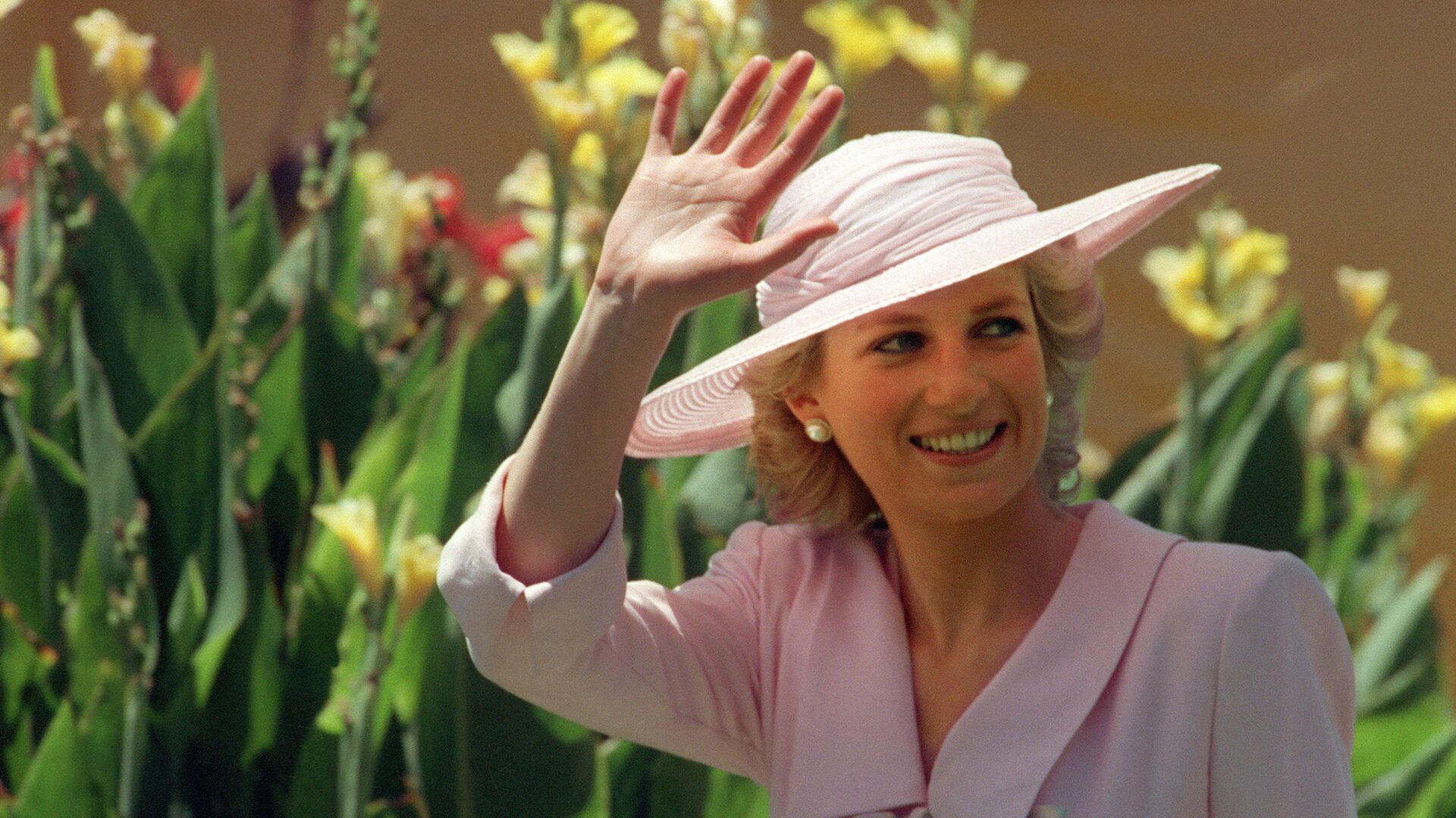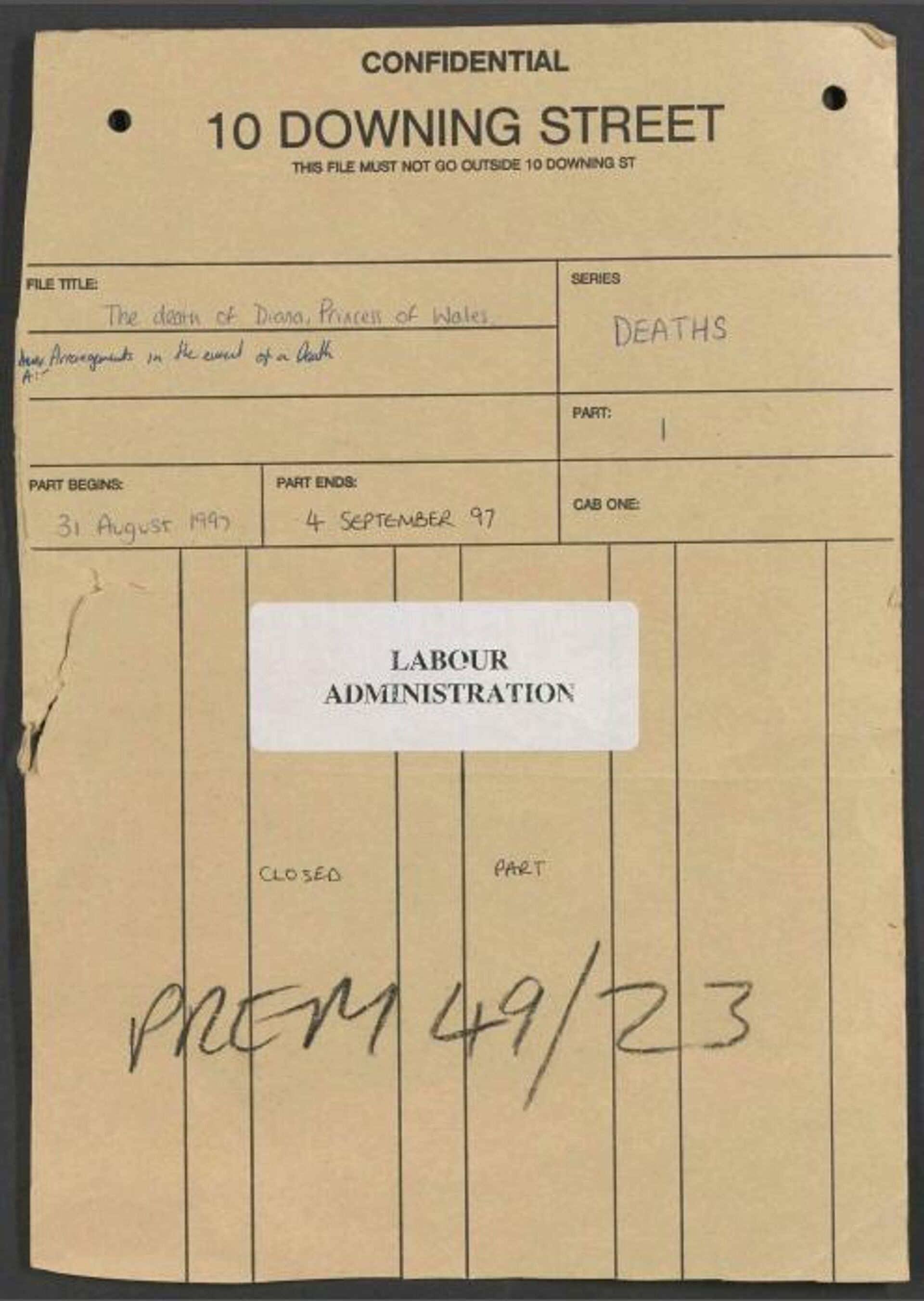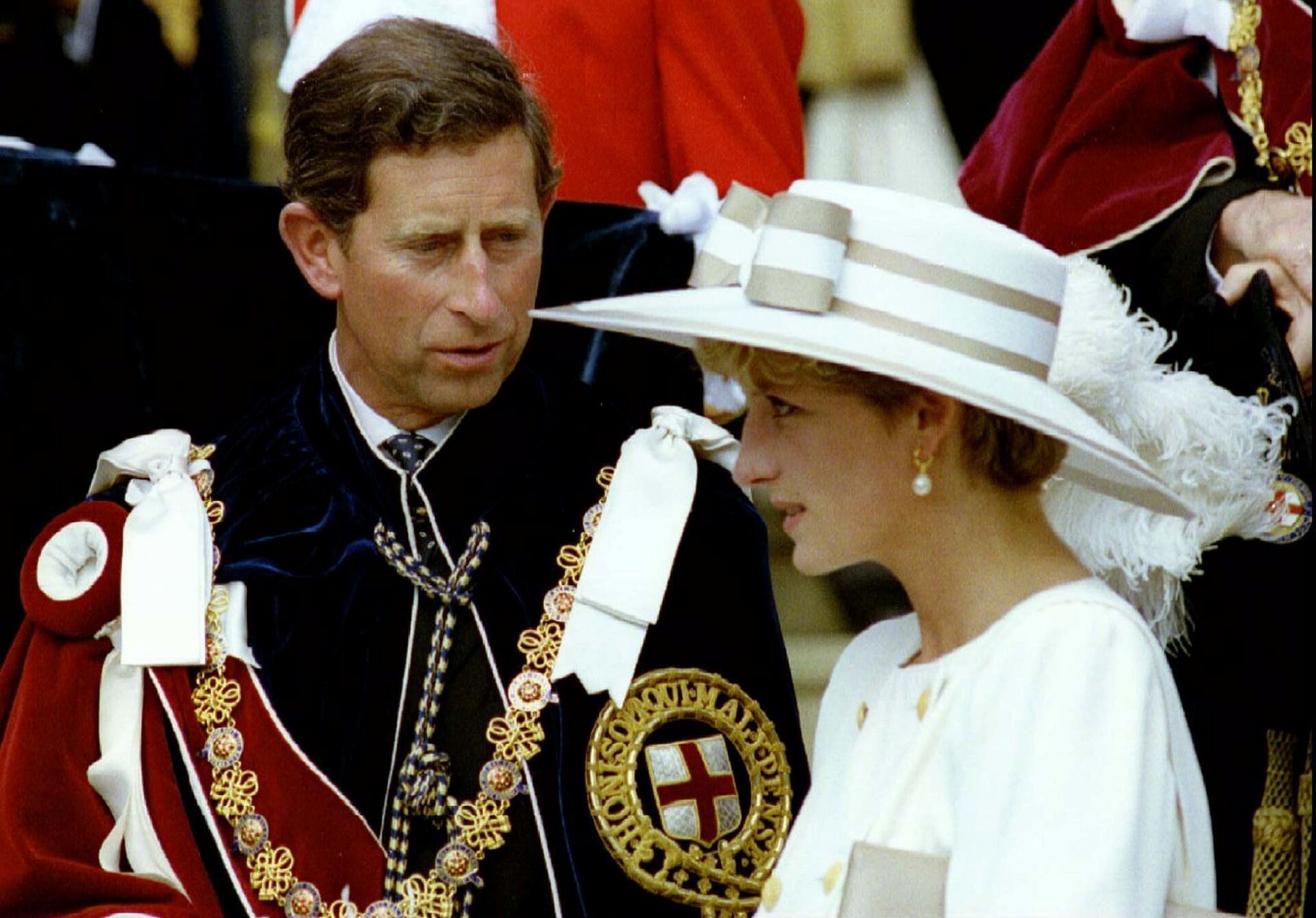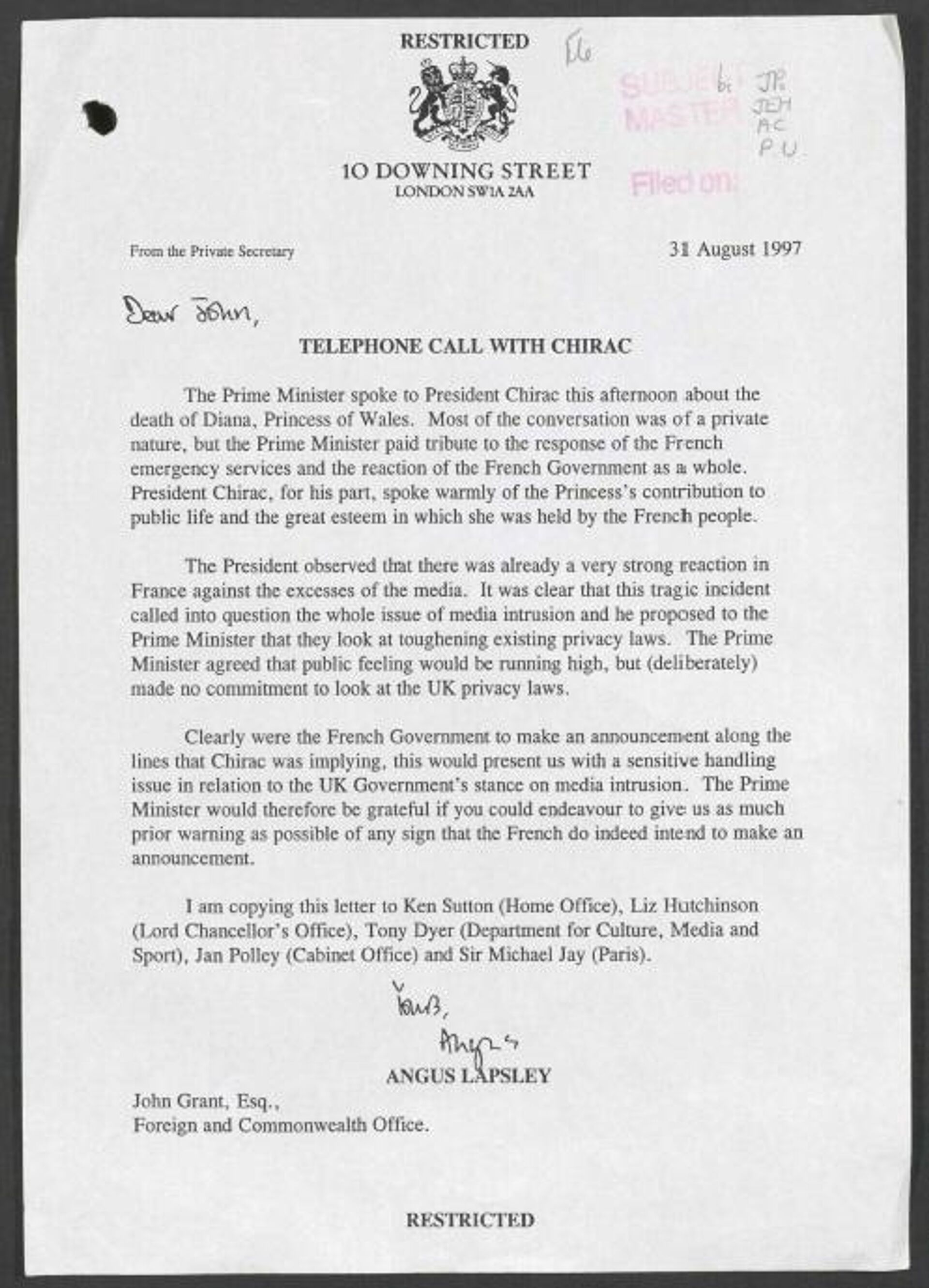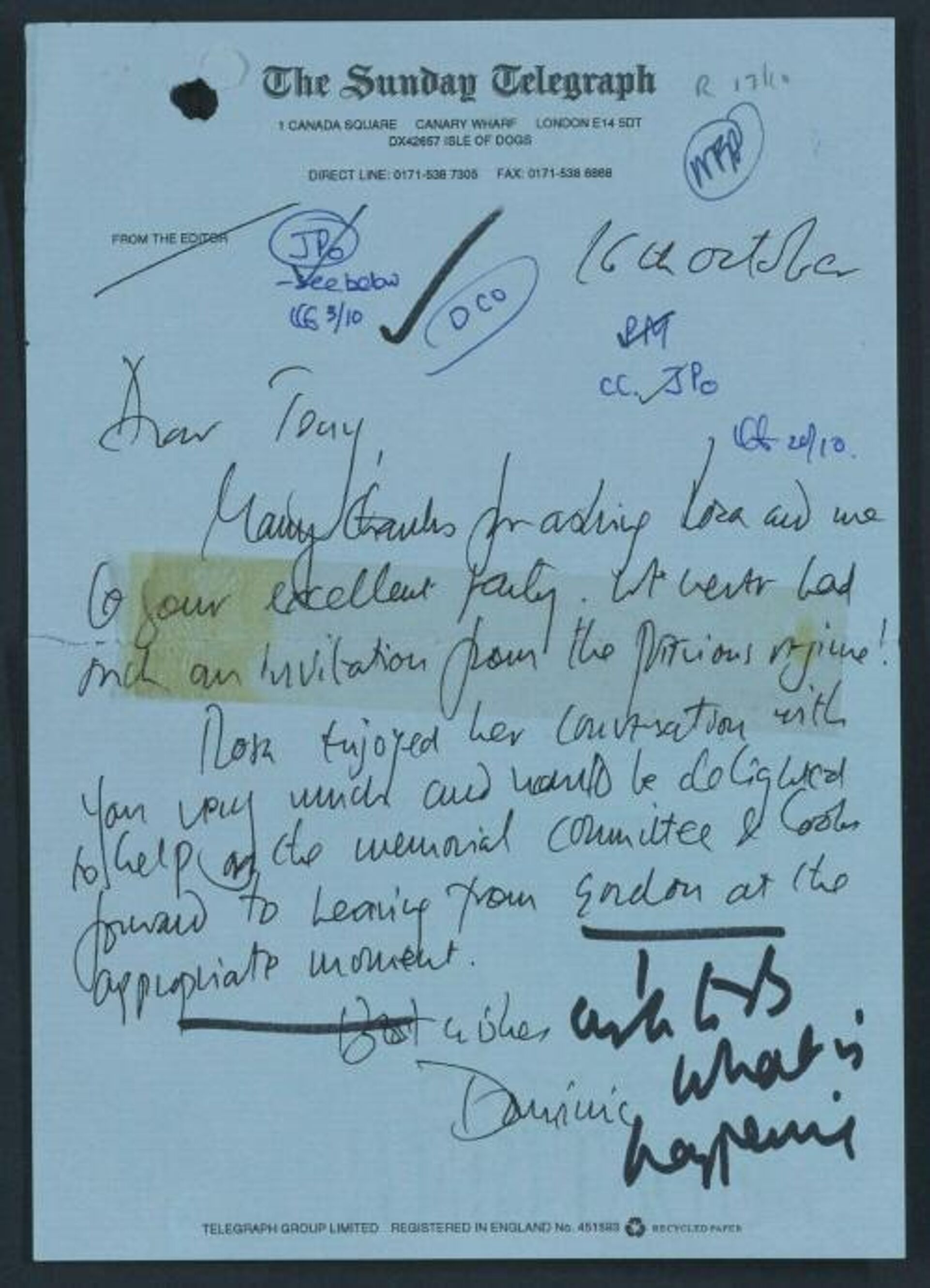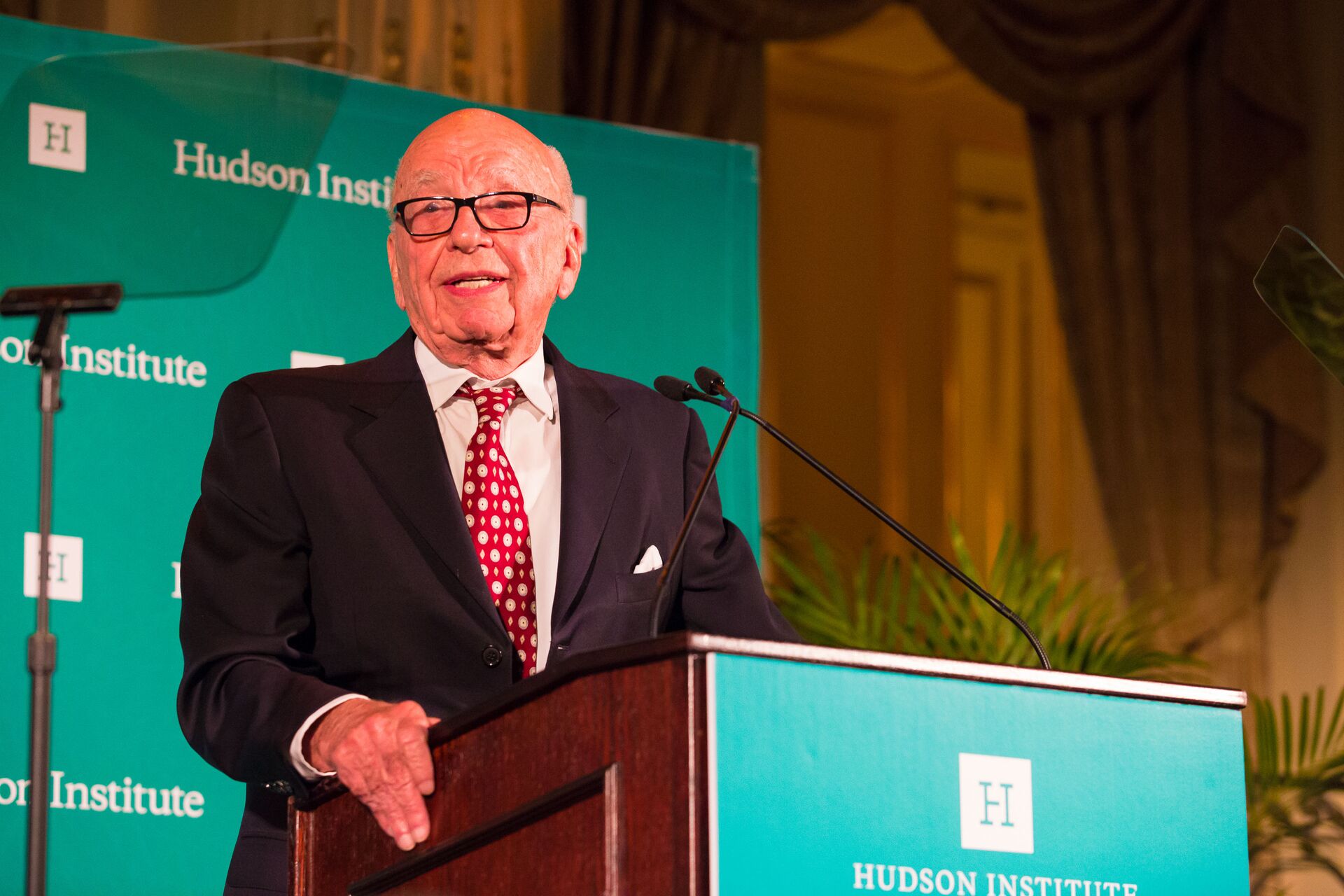https://sputnikglobe.com/20211230/princess-di-file-blurred-line-between-the-press-and-the-state-1091887783.html
Princess Di File: Blurred Line Between the Press and the State
Princess Di File: Blurred Line Between the Press and the State
Sputnik International
Even at the height of public outrage over press intrusion into the private life of Diana Princess of Wales that had caused her tragic death, the British government refused to end its "incestuous relationship" with media moguls, Government papers just released to the National Archives in London reveal.
2021-12-30T00:01+0000
2021-12-30T00:01+0000
2023-05-28T15:17+0000
rupert murdoch
tony blair
princess diana
gordon brown
press
columnists
united kingdom (uk)
https://cdn1.img.sputnikglobe.com/img/07e5/05/14/1082945641_0:27:2500:1433_1920x0_80_0_0_b65c51902a81aa7fe1ffff2396c21339.jpg
The death of Princess Diana in a car crash in Paris on 31 August 1997, while trying to shake off a swarm of paparazzi hacks, sent shockwaves around the world. The strong feeling of indignation towards the intrusive press was epitomised by US First Lad Hilary Clinton, who was intent on attacking the media in her tribute to Princess Diana at the funeral. Her British hosts were not amused.Four days into the mourning, Prime Minister Tony Blair’s Chief of Staff Jonathan Powell alerted Alastair Campbell, Blair’s director of communications, to the "danger":"Good", minuted Tony Blair's spin doctor on the margins of the message. New Labour could hardly afford to fall out with the popular press that had played a major hand in their election a mere four months ago.Now the press was under scrutiny from all quarters. Tony Blair’s Private Secretary Angus Lapsley [the one who dumped secret Ministry of Defence files at a bus stop last August] briefed John Grant, principal private secretary to the foreign secretary, on a phone call between the prime minister and French President Jacques Chirac:Tony Blair agreed that public feeling would be running high, "but (deliberately) made no commitment to look at the UK privacy laws", said Lapsley.Were the French government to make an announcement along the line that Chirac was implying, wrote Lapsley, "this would present us with a sensitive handling issue in relation to the UK Government's stance on media intrusion". Lapsley asked the Foreign Office to be on guard and give the prime minister as much prior warning as possible of any sign that the French did indeed intend to make an announcement about the need to tighten press privacy laws.The explosive topic was bound to come up during Tony Blair’s appearance on prime-time TV show Frost on Sunday a mere five days after the princess' death, and his private secretary advised him to tread carefully:Well, judging by the Phone Hacking Scandal, spanning over a decade, the "change of heart" never really happened – and why should it have?Phone Hacking ScandalThe scandal came to a boil in 2005 with yet another press intrusion into Diana’s family life – this time targeting her son Prince William. But it had been simmering under the surface well before that.In November 2005, British tabloid News of the World (NoW), owned by Australian-born media mogul and US citizen Rupert Murdoch, published a story about Prince William injuring his knee. The Royal household suspected voicemail hacking and complained to the police.In January 2007, NoW’s Royal Editor Clive Goodman and private investigator Glen Mulcaire were sent to prison for conspiracy to eavesdrop on the royals. NoW Editor Andy Coulson resigned, insisting he had not known of the problem. But one of his former reporters claimed that not only was his editor well aware of the phone hacking, but condoned it. This did not stop the Conservative Party from hiring Coulson as their director of communications, and later as Prime Minister David Cameron’s chief media adviser. Eventually, he had to resign and stand trial amid new allegations of his complicity in the phone hacking.According to Scotland Yard, almost 6,000 people were likely victims of phone hacking by NoW journalists. Their targets ranged from top politicians and celebrities to little girls abducted and murdered by criminals. Such a wide-ranging operation could have hardly been possible without “a little help” from police insiders. And indeed, top British police boss Sir Paul Stevenson had to step down over allegations of police bribery. Ironically, his own media adviser was implicated in the phone-hacking scandal. During a subsequent investigation, it emerged that 10 out of 45 members of the Metropolitan Police Department of Public Affairs had once worked for Rupert Murdoch’s News International, the owners of News of the World.But the "incestuous relationship", to use a phrase from the 2020 BBC documentary on The Murdoch Dynasty, between the tabloid press and the British powers that be did not end there.Another Murdoch paper, The Sun, made shockwaves across the UK when at the height of the 1997 general election, it published a “Sun backs Blair” front page after declaring “it was the Sun who won it” for the Conservatives in the previous election.Rupert Murdoch became "effectively a member of Blair's Cabinet", as Lance Price, a former deputy to Tony Blair’s spokesman Alastair Campbell from 1998 to 2001 reminisced:GodfatherThe sinister irony here is that both Brown and Prescott were among the victims of phone hacking by Murdoch’s journalists, as were some other members of the New Labour government. Yet Blair never saw fit to criticise Murdoch on this astonishing breach of national security, observed The Guardian newspaper in September 2011 when it emerged that Tony Blair was godfather to one of Murdoch's daughters.The Guardian said Blair told them the request from Murdoch to be a godfather came after he stepped down as Prime Minister, and the ceremony itself took place three years after he had left office; but the relationship underlined Murdoch’s deep entrenchment in British political life.The relationship between the two after New Labour gained power was "almost incestuous", former Sunday Times editor Andrew Neil told the BBC documentary The Rise of the Murdoch Dynasty in July 2020.Blurred LineA committee to consider proposals from the public to commemorate Diana was set up under the chairmanship of Chancellor Gordon Brown. Among the five members representing the Royal and Spencer families, and the Princess’ Memorial Fund, there cropped up Princess Di's "closest friend Rosa Monckton". Tony Blair approved the list, but the most senior civil servant, Cabinet Secretary Sir Robin Butler, was surprised:But singled out she was. And that’s probably why. Her husband Dominic Lawson, editor of The Sunday Telegraph, a broadsheet owned by another foreign media tycoon, Canadian Conrad Black, had written to Tony Blair, thanking him for having invited Lawson and his wife to Blair’s "excellent party". Lawson confessed that they "never had such an invitation from the previous regime" (Thatcher and Major), and then plugged his wife for a seat on the Diana Memorial Committee:Fast forward 20 years and this time a Conservative prime minister, Boris Johnson, started referring to The Daily Telegraph [Sunday Telegraph’s sister publication], for which he had previously written a column, as his "real boss", Dominic Cummings, Johnson's former chief adviser, told the BBC.How Democracy WorksIn December 1995, Princess Di was invited to give a speech at the United Cerebral Palsy Society of New York Annual Dinner. She had specifically asked to be seated "between a couple of ordinary folks in recognition of the fact that acts of humanity are important regardless of the status of those concerned. We are called to dignify each other, regardless of whether we are Dukes or dustman, Princesses or paupers".Having assumed that her wish would be honoured, she thanked the organisers in her pre-written remarks for seating her "among some extremely ordinary individuals". Actually, she ended up being seated next to… Rupert Murdoch!A BBC trailer of its 2020 documentary about The Rise of the Murdoch Dynasty says:Is it not "highly likely" that this is how Western democracy works?
united kingdom (uk)
Sputnik International
feedback@sputniknews.com
+74956456601
MIA „Rossiya Segodnya“
2021
News
en_EN
Sputnik International
feedback@sputniknews.com
+74956456601
MIA „Rossiya Segodnya“
Sputnik International
feedback@sputniknews.com
+74956456601
MIA „Rossiya Segodnya“
princess diana, uk, great britain, lady di
princess diana, uk, great britain, lady di
Princess Di File: Blurred Line Between the Press and the State
00:01 GMT 30.12.2021 (Updated: 15:17 GMT 28.05.2023) Even at the height of public outrage over press intrusion into the private life of Diana Princess of Wales that caused her tragic death, the British government refused to end its "incestuous relationship" with media moguls, government papers just released to the National Archives in London reveal.
The death of Princess Diana in a car crash in Paris on 31 August 1997, while trying to shake off a swarm of paparazzi hacks, sent shockwaves around the world. The strong feeling of indignation towards the intrusive press was epitomised by US First Lad Hilary Clinton, who was intent on attacking the media in her
tribute to Princess Diana at the funeral. Her British hosts were not amused.
Four days into the mourning, Prime Minister Tony Blair’s Chief of Staff Jonathan Powell alerted Alastair Campbell, Blair’s director of communications, to the "danger":
"I attach an article by Hilary Clinton on Diana. She is asking for advice on what she should say to the press here when she comes. Her personal inclination is to attack the press, but her staff are stopping her from doing so".
"Good", minuted Tony Blair's spin doctor on the margins of the message. New Labour could hardly afford to fall out with the popular press that had played a major hand in their election a mere four months ago.
Now the press was under scrutiny from all quarters. Tony Blair’s Private Secretary Angus Lapsley [the one who dumped secret Ministry of Defence files at a bus stop last August] briefed John Grant, principal private secretary to the foreign secretary, on a phone call between the prime minister and French President Jacques Chirac:
"The President observed that there was already a very strong reaction in France against the excesses of the media. It was clear that this tragic incident called into question the whole issue of media intrusion and he proposed to the Prime Minister that they look at toughening existing privacy laws".
Tony Blair agreed that public feeling would be running high, "but (deliberately) made no commitment to look at the UK privacy laws", said Lapsley.
Were the French government to make an announcement along the line that Chirac was implying, wrote Lapsley, "this would present us with a sensitive handling issue in relation to the UK Government's stance on media intrusion". Lapsley asked the Foreign Office to be on guard and give the prime minister as much prior warning as possible of any sign that the French did indeed intend to make an announcement about the need to tighten press privacy laws.
The explosive topic was bound to come up during Tony Blair’s appearance on prime-time TV show
Frost on Sunday a mere five days after the
princess' death, and his private secretary advised him to tread carefully:
"You cannot pretend that we are not thinking about the issue of [changes to privacy laws], but you can put down two important markers by indicating that you see the limitations of laws as a means of controlling press intrusion and that you think that really the most important factor must be a change of heart from the press itself", wrote Lapsley.
Well, judging by the Phone Hacking Scandal, spanning over a decade, the "change of heart" never really happened – and why should it have?
The scandal came to a boil in 2005 with yet another press intrusion into Diana’s family life – this time targeting her son Prince William. But it had been simmering under the surface well before that.
In November 2005, British tabloid News of the World (NoW), owned by Australian-born media mogul and US citizen Rupert Murdoch, published a story about Prince William injuring his knee. The Royal household suspected voicemail hacking and complained to the police.
In January 2007, NoW’s Royal Editor Clive Goodman and private investigator Glen Mulcaire were sent to prison for conspiracy to eavesdrop on the royals. NoW Editor Andy Coulson resigned, insisting he had not known of the problem. But one of his former reporters claimed that not only was his editor well aware of the phone hacking, but condoned it. This did not stop the Conservative Party from hiring Coulson as their director of communications, and later as Prime Minister David Cameron’s chief media adviser. Eventually, he had to resign and stand trial amid new allegations of his complicity in the phone hacking.
According to Scotland Yard, almost 6,000 people were likely victims of phone hacking by NoW journalists. Their targets ranged from top politicians and celebrities to little girls abducted and murdered by criminals. Such a wide-ranging operation could have hardly been possible without “a little help” from police insiders.
And indeed, top British police boss Sir Paul Stevenson had to step down over allegations of police bribery. Ironically, his own media adviser was implicated in the phone-hacking scandal. During a subsequent investigation, it emerged that 10 out of 45 members of the Metropolitan Police Department of Public Affairs had once worked for Rupert Murdoch’s News International, the owners of News of the World.
But the "incestuous relationship", to use a phrase from the 2020 BBC documentary on The Murdoch Dynasty, between the tabloid press and the British powers that be did not end there.
Another Murdoch paper, The Sun, made shockwaves across the UK when at the height of the 1997 general election, it published a “Sun backs Blair” front page after declaring “it was the Sun who won it” for the Conservatives in the previous election.
Rupert Murdoch became "effectively a member of Blair's Cabinet", as Lance Price, a former deputy to Tony Blair’s spokesman Alastair Campbell from 1998 to 2001 reminisced:
"No big decision could ever be made inside No 10 without taking account of the likely reaction of three men – [Chancellor] Gordon Brown, [deputy PM] John Prescott and Rupert Murdoch".
The sinister irony here is that both Brown and Prescott were among the victims of phone hacking by Murdoch’s journalists, as were some other members of the New Labour government. Yet Blair never saw fit to criticise Murdoch on this astonishing breach of national security, observed The Guardian newspaper in September 2011 when it emerged that Tony Blair was godfather to one of Murdoch's daughters.
The Guardian said Blair told them the request from Murdoch to be a godfather came after he stepped down as Prime Minister, and the ceremony itself took place three years after he had left office; but the relationship underlined Murdoch’s deep entrenchment in British political life.
The relationship between the two after New Labour gained power was "almost incestuous", former Sunday Times editor Andrew Neil told the BBC documentary The Rise of the Murdoch Dynasty in July 2020.
"The line between church and state, if I can put it [that way], between press and state, became so blurred that at one stage it was quite hard to tell which was which", Neil said.
A committee to consider proposals from the public to commemorate Diana was set up under the chairmanship of Chancellor Gordon Brown. Among the five members representing the Royal and Spencer families, and the Princess’ Memorial Fund, there cropped up Princess Di's "closest friend Rosa Monckton". Tony Blair approved the list, but the most senior civil servant, Cabinet Secretary Sir Robin Butler, was surprised:
"Rosa Monckton was one of a number of the Princesses' close friends rather than being the closest. It may therefore be unfair to the others to single her out in this way".
But singled out she was. And that’s probably why. Her husband Dominic Lawson, editor of The Sunday Telegraph, a broadsheet owned by another foreign media tycoon, Canadian Conrad Black, had written to Tony Blair, thanking him for having invited Lawson and his wife to Blair’s "excellent party".
Lawson confessed that they "never had such an invitation from the previous regime" (Thatcher and Major), and then plugged his wife for a seat on the Diana Memorial Committee:
“Rosa enjoyed her conversation with you very much and would be delighted to help on the memorial committee & looks forward to hearing from Gordon [Brown] at the appropriate moment”.
Fast forward 20 years and this time a Conservative prime minister, Boris Johnson, started referring to The Daily Telegraph [Sunday Telegraph’s sister publication], for which he had previously written a column, as his "real boss",
Dominic Cummings, Johnson's former chief adviser, told the BBC.
In December 1995, Princess Di was invited to give a speech at the United Cerebral Palsy Society of New York Annual Dinner. She had specifically asked to be seated "between a couple of ordinary folks in recognition of the fact that acts of humanity are important regardless of the status of those concerned. We are called to dignify each other, regardless of whether we are Dukes or dustman, Princesses or paupers".
Having assumed that her wish would be honoured, she thanked the organisers in her pre-written remarks for seating her "among some extremely ordinary individuals". Actually, she ended up being seated next to… Rupert Murdoch!
A BBC trailer of its 2020 documentary about The Rise of the Murdoch Dynasty says:
“Critics claim that Murdoch’s organisation cultivated too much influence over the British government – lobbying for war in Iraq, enjoying open access to the Prime Minister and favourable treatment when it comes to business. Supporters, however, claim that is how business works”.
Is it not "highly likely" that this is how Western democracy works?
